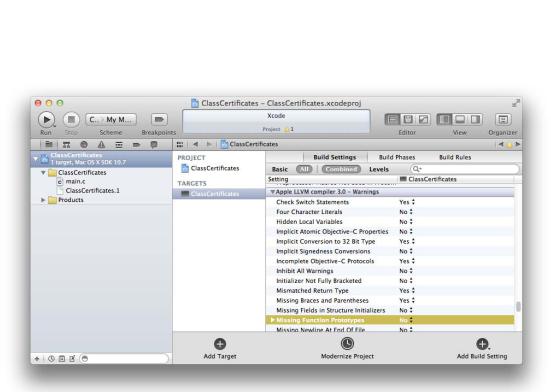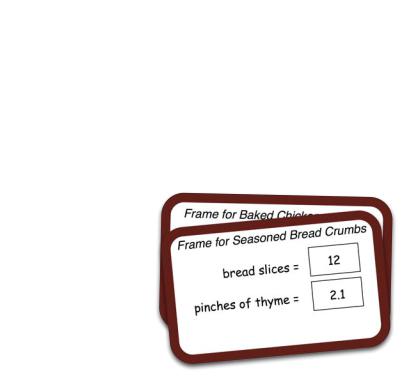
- •C and Objective-C
- •How this book works
- •How the life of a programmer works
- •Installing Apple’s developer tools
- •Getting started with Xcode
- •Where do I start writing code?
- •How do I run my program?
- •So what is a program?
- •Don’t stop
- •Types
- •A program with variables
- •Challenge
- •Boolean variables
- •When should I use a function?
- •How do I write and use a function?
- •How functions work together
- •Local variables, frames, and the stack
- •Recursion
- •Looking at the frames in the debugger
- •return
- •Global and static variables
- •Challenge
- •printf()
- •Integer operations
- •Integer division
- •Operator shorthand
- •Floating-point numbers
- •Tokens for displaying floating-point numbers
- •The while loop
- •The for loop
- •break
- •continue
- •The do-while loop
- •Challenge
- •Getting addresses
- •Storing addresses in pointers
- •Getting the data at an address
- •How many bytes?
- •NULL
- •Stylish pointer declarations
- •Challenges
- •Writing pass-by-reference functions
- •Avoid dereferencing NULL
- •Creating and using your first object
- •Message anatomy
- •Objects in memory
- •Challenge
- •Nesting message sends
- •Multiple arguments
- •Sending messages to nil
- •Challenge
- •Challenge
- •NSMutableArray
- •Reference pages
- •Quick Help
- •Other options and resources
- •Accessor methods
- •Dot notation
- •Properties
- •self
- •Multiple files
- •Challenge
- •Overriding methods
- •super
- •Challenge
- •Object ownership and ARC
- •Creating the Asset class
- •Adding a to-many relationship to Employee
- •Challenge
- •Retain cycles
- •Weak references
- •Zeroing of weak references
- •For the More Curious: Manual reference counting and ARC History
- •Retain count rules
- •NSArray/NSMutableArray
- •Immutable objects
- •Sorting
- •Filtering
- •NSSet/NSMutableSet
- •NSDictionary/NSMutableDictionary
- •Preprocessor directives
- •#include and #import
- •#define
- •Global variables
- •enum
- •#define vs global variables
- •Writing an NSString to a file
- •Reading files with NSString
- •Writing an NSData object to a file
- •Reading an NSData from a file
- •Target-action
- •Helper objects
- •Notifications
- •Which to use?
- •Callbacks and object ownership
- •Challenge
- •Getting started with iTahDoodle
- •BNRAppDelegate
- •Adding a C helper function
- •Objects in iTahDoodle
- •Model-View-Controller
- •The application delegate
- •Setting up views
- •Running on the iOS simulator
- •Wiring up the table view
- •Adding new tasks
- •Saving task data
- •For the More Curious: What about main()?
- •Edit BNRDocument.h
- •A look at Interface Builder
- •Edit BNRDocument.xib
- •Making connections
- •Revisiting MVC
- •Edit BNRDocument.m
- •Writing init methods
- •A basic init method
- •Using accessors
- •init methods that take arguments
- •Deadly init methods
- •Property attributes
- •Mutability
- •Lifetime specifiers
- •copy
- •More about copying
- •Advice on atomic vs. nonatomic
- •Key-value coding
- •Non-object types
- •Defining blocks
- •Using blocks
- •Declaring a block variable
- •Assigning a block
- •Passing in a block
- •typedef
- •Return values
- •Memory management
- •The block-based future
- •Challenges
- •Anonymous block
- •NSNotificationCenter
- •Bitwise-OR
- •Bitwise-AND
- •Other bitwise operators
- •Exclusive OR
- •Complement
- •Left-shift
- •Right-shift
- •Using enum to define bit masks
- •More bytes
- •Challenge
- •char
- •char *
- •String literals
- •Converting to and from NSString
- •Next Steps
- •Index

Chapter 5 Functions
Figure 5.1 Disabling Missing Function Prototypes warning
How functions work together
A program is a collection of functions. When you run a program, those functions are copied from the hard drive into memory, and the processor finds the function called “main” and executes it.
Remember that a function is like a recipe card. If I began to execute the “Baked Chicken” card, I would discover that the second instruction is “Make Seasoned Bread Crumbs,” which is explained on another card. A programmer would say “the Baked Chicken function calls the Seasoned Bread Crumbs function.”
30

How functions work together
Figure 5.2 Recipe cards
Similarly, the main function can call other functions. For example, your main function in ClassCertificates called the congratulateStudent function, which in turn called printf.
While you are preparing the seasoned bread crumbs, you stop executing the “Baked Chicken” card. When the bread crumbs are ready, you resume working through the “Baked Chicken” card.
Similarly, the main function stops executing and “blocks” until the function it calls is done executing. To see this happen, we’re going to call a sleep function that does nothing but wait a number of seconds. In your main function, add a call to sleep.
int main (int argc, const char * argv[])
{
congratulateStudent("Mark", "Cocoa", 5); sleep(2);
congratulateStudent("Bo", "Objective-C", 2); sleep(2);
congratulateStudent("Mike", "PHP and PostgreSQL", 5); sleep(2);
congratulateStudent("Ted", "iOS", 5);
return 0;
}
Build and run the program. (Ignore the warning about an implicit declaration for now.) You should see a 2-second pause between each message of congratulations. That’s because the main function stops running until the sleep function is done sleeping.
Notice that when you call a function, you use its name and a pair of parentheses for its arguments. Thus, when we talk about functions, we usually include a pair of empty parentheses. From now on, we will say main() when we talk about the main function.
Your computer came with many functions built-in. Actually, that is a little misleading – here is the truth: Before Mac OS X was installed on your computer, it was nothing but an expensive space
31

Chapter 5 Functions
heater. Among the things that were installed as part of Mac OS X were files containing a collection of precompiled functions. These collections are called the standard libraries. sleep() and printf() are included in these standard libraries.
At the top of main.c, you included the file stdio.h. This file contains a declaration of the function printf() and lets the compiler check to make sure that you are using it correctly. The function sleep() is declared in stdlib.h. Include that file, too, so that the compiler will stop complaining that sleep() is implicitly declared:
#include <stdio.h>
#include <stdlib.h>
void congratulateStudent(char *student, char *course, int numDays)
{
…
The standard libraries serve two functions:
•They represent big chunks of code that you don’t need to write and maintain. Thus, they empower you to build much bigger, better programs than you would be able to do otherwise.
•They ensure that most programs look and feel similar.
Programmers spend a lot of time studying the standard libraries for the operating systems that they work on. Every company that creates an operating system also has documentation for the standard libraries that come with it. You’ll learn how to browse the documentation for iOS and Mac OS X in Chapter 16.
Local variables, frames, and the stack
Every function can have local variables. Local variables are variables declared inside a function. They exist only during the execution of that function and can only be accessed from within that function. For example, imagine that you were writing a function that computed how long to cook a turkey. It might look like this:
void showCookTimeForTurkey(int pounds)
{
int necessaryMinutes = 15 + 15 * pounds; printf("Cook for %d minutes.\n", necessaryMinutes);
}
necessaryMinutes is a local variable. It came into existence when showCookTimeForTurkey() started to execute and will cease to exist once that function completes execution. The parameter of the function, pounds, is also a local variable. A parameter is a local variable that has been initialized to the value of the corresponding argument.
A function can have many local variables, and all of them are stored in the frame for that function. Think of the frame as a blackboard that you can scribble on while the function is running. When the function is done executing, the blackboard is discarded.
Imagine for a moment that you are working on the Baked Chicken recipe. In your kitchen, all recipes get their own blackboards, so you have a blackboard for the Baked Chicken recipe ready. Now, when
32

Local variables, frames, and the stack
you call the Seasoned Bread Crumbs recipe, you need a new blackboard. Where are you going to put it? Right on top of the blackboard for Baked Chicken. After all, you’ve suspended execution of Baked Chicken to make Seasoned Bread Crumbs. You won’t need the Baked Chicken frame until the
Seasoned Bread Crumbs recipe is complete and its frame is discarded. What you have now is a stack of frames.
Figure 5.3 Two blackboards in a stack
Programmers say, “When a function is called, its frame is created on top of the stack. When the function finishes executing, its frame is popped off the stack and destroyed.”
Let’s look more closely at how the stack works by putting showCookTimeForTurkey() into a hypothetical program:
void showCookTimeForTurkey(int pounds)
{
int necessaryMinutes = 15 + 15 * pounds; printf("Cook for %d minutes.\n", necessaryMinutes);
}
int main(int argc, const char * argv[])
{
int totalWeight = 10; int gibletsWeight = 1;
int turkeyWeight = totalWeight - gibletsWeight; showCookTimeForTurkey(turkeyWeight);
return 0;
}
Recall that main() is always executed first. main() calls showCookTimeForTurkey(), which begins executing. What, then, does this program’s stack look like just after pounds is multiplied by 15?
33
